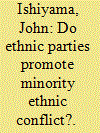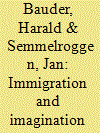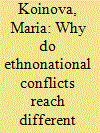| Srl | Item |
| 1 |
ID:
108675


|
|
|
|
|
| Publication |
2009.
|
| Summary/Abstract |
Since the end of the Second World War, principles of diversity and multiculturalism have increasingly been codified in international law. The present article takes a closer look at the evolution of Canada's attitude towards the recognition of its multinational character over the past 25 years. The article shows that the more recent idea of "open federalism" put forward by Prime Minister Stephen Harper's government as a recognition of multinationalism closely resembles the monist idea of the state that was promoted by former Prime Minister Pierre Elliot Trudeau. Thus, contrary to what is being portrayed in political discourses, nothing much has changed over the last 25 years. Stephen Harper's "open federalism" remains largely inspired by philosophical elements of monism and does not contribute to making Canada a truly multinational state.
|
|
|
|
|
|
|
|
|
|
|
|
|
|
|
|
| 2 |
ID:
108676


|
|
|
|
|
| Publication |
2009.
|
| Summary/Abstract |
Do ethnic parties exacerbate ethnic conflict? Many scholars have argued that the mere appearance of ethnic parties inevitably leads to a spiral of ethnic conflict and the collapse of incipient democracies. This article tests this proposition by examining how ethnic parties affect protest and communal conflict across 82 countries and 213 ethnic/communal groups from 1985-2003. Using a variety of quantitative techniques, I find that ethnic parties do mobilize minority ethnic groups to engage in protest, but there is no natural connection between the appearance of ethnic parties and the extent to which the minority group engages in communal conflict.
|
|
|
|
|
|
|
|
|
|
|
|
|
|
|
|
| 3 |
ID:
108673


|
|
|
|
|
| Publication |
2009.
|
| Summary/Abstract |
Immigration policy and debate can reveal how a nation imagines itself. This study examines the dialectic between immigration and German nationhood in the context of the parliamentary debates between 2002 and 2006. Contents and discourse analyses of transcripts of the Bundestag were supplemented with interviews with policymakers. Our interpretation of the data reveals two distinct narratives: that Muslim immigration is a threat to the democratic order of the German state; and that immigration constitutes a utility serving economical and social objectives. European Union regulations, party politics, and the nature of parliamentary speech also play a role in framing parliamentary discourse of immigration and nationhood.
|
|
|
|
|
|
|
|
|
|
|
|
|
|
|
|
| 4 |
ID:
108678


|
|
|
|
|
| Publication |
2009.
|
| Summary/Abstract |
During the past 20 years, Jewish-Ukrainian relations in Ukraine have undergone four phases, beginning with a relatively open and optimistic phase during the years of late perestroika to the present Potemkin-like status. The current president of Ukraine insists that all is well despite indicators that point to sharp increases in the manifestation of traditional anti-Semitism, as well as an official entrenchment of a histiography that excludes the history of Jews in a country that once had one of the largest populations of Jews in the world.
|
|
|
|
|
|
|
|
|
|
|
|
|
|
|
|
| 5 |
ID:
108677


|
|
|
|
|
| Publication |
2009.
|
| Summary/Abstract |
Why did ethnonational conflicts reach different degrees of violence during the 1990s: high in Kosovo, middle-ranged in Macedonia, and low in Bulgaria? This article analyzes the relationship between the Albanians of Macedonia and Kosovo, the Turks of Bulgaria, and their respective states. Challenging democratization and security dilemma theories, it argues that the relative changes in minority rights compared to the communist period, rather than the absolute scope of minority rights granted by the new constitutions, created a political threshold early in the transition period that propelled causal chains of minority-majority interactions that led to different degrees of ethnonational violence. Combined with the status change, governmental strategies of co-optation, or coercion prompted the minorities to pursue their demands either through the institutions of the state (Bulgaria), through clandestine activities (Kosovo), or through a combination of both (Macedonia). This article also argues that a timely governmental response to nonterritorial minority demands prevented them from expanding to become territorial and from triggering higher levels of violence.
|
|
|
|
|
|
|
|
|
|
|
|
|
|
|
|